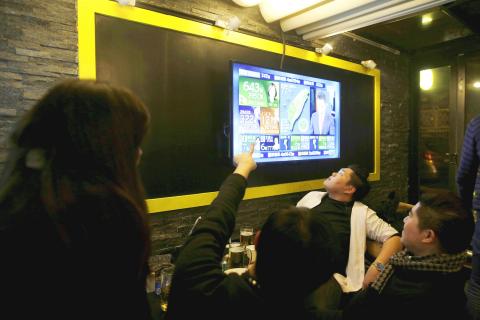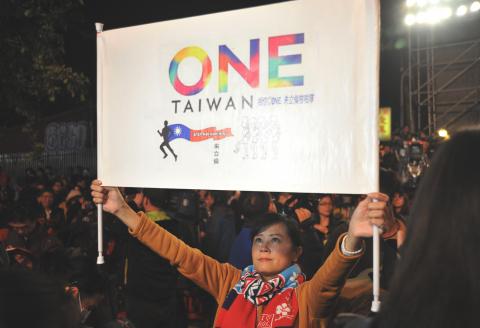The Chinese Nationalist Party’s (KMT) defeat in yesterday’s elections showed the complete failure of the policies of President Ma Ying-jeou’s (馬英九) administration.
The Democratic Progressive Party (DPP) won both the presidency and control of the legislature for the first time in Taiwan’s history, scoring a resounding victory over the KMT, which also came in second in party votes.
The major focus of the Ma administration, his cross-strait policies, including the signing of the Economic Cooperation Framework Agreement (ECFA) and negotiation of the cross-strait service trade accord and the cross-strait goods trade accord, his “personal historical achievement” in meeting Chinese President Xi Jinping (習近平) and promises made by KMT presidential candidate Eric Chu (朱立倫) to continue Ma’s policies, proved to be the party’s Achilles heel.

Photo: Reuters
Peace across the Taiwan Strait is not the sole concern of the KMT and the Chinese Communist Party (CCP), but the roots of the doubts gnawing at the public about opening up to China lies in the inherent differences of the two nations’ political systems, quality of life and views on democracy.
When Beijing seeks to cordon off Taiwan with its “one China” principle, it makes Taiwanese feel they have lost all say in the future of their nation.
Despite couching its designs behind the KMT’s so-called “1992 consensus,” China has proven that closer ties with it come only at a severe cost to Taiwan’s sovereignty and dignity.

Photo: Sandy Cheng, AFP
The ECFA has benefitted only certain groups and social classes, leaving Ma without convincing reasons to show a majority of Taiwanese that further tightening of the ties with China would make their lives better. It turns out that increased cross-strait interaction has only shown Taiwan the CCP’s true face.
Continuing to pursue ties with China despite the lack of an internal consensus on how the nation should deal with its larger neighbor has only deepened the public’s mistrust and triggered the Sunflower movement, which began with the occupation of the Legislative Yuan’s main chamber on March 18, 2014.
That protest, coupled with the landside defeat the KMT suffered in the nine-in-one elections on Nov. 29 of that year, were the public’s retaliation against the Ma administration’s brutish dismissal of their concerns and interests.
Yesterday’s results simply served as further confirmation that the Ma administration’s cross-strait policies would be consigned to history’s garbage can.
The priority the administration placed on cross-strait policies led to dysfunctional diplomatic and defense polices as well. The abandonment of “cash diplomacy” tactics and a diplomatic detente are two different things; detente is not surrender.
The direct result of Ma’s detente with Beijing on the diplomatic front led Taiwan to become entirely reliant, even subservient, to China on the international front. This was never a viable path; it is the path of the walking dead.
However, the Ma government’s grand failure was in its handling of the economy and public welfare.
From the moment his administration took office in May 2008, it came in for criticism over its inept response to natural disaster and economic problems — its belated reaction to Typhoon Morakot and resulting incompetence; an inability to meet Ma’s “6-3-3” campaign promise of 6 percent annual economic growth, US$30,000 per capita income and an unemployment rate lower than 3 percent by 2012, even though Ma kept pushing back the goalposts in terms of delivery deadlines.
His dismissal of public concerns about the safety of the Fourth Nuclear Power Plant, the hiking of gas and electricity prices, controversial adjustments to the national high-school curriculum only served to fuel public anger, anger that found its voice in the November 2014 polls and again yesterday.
The political strife between Ma and Legislative Speaker Wang Jin-pyng (王金平) badly split the KMT and cost the president his leverage in the legislature as well as with internal KMT reforms.
His distance from the party and unwillingness to promote KMT members, relying instead on a clique of “trusted advisers and confidants,” led to younger KMT members shying away from his administration and seeking public office.
In short, the KMT’s landslide loss yesterday was deeply rooted in Ma’s actions and the party’s own mistakes.
However, the biggest casualty is Chu, who not only lost the election, but has surrendered the KMT chairmanship.
His credibility with the pan-blue bloc was already circling the drain when he decided to replace Deputy Legislative Speaker Hung Hsiu-chu (洪秀柱) in the race. Now his political capability and political authority are being questioned.
Chu’s failure to identify with any of the younger rising political stars in the party may spell a period of internal fragmentation for the KMT in the months, even years, to come.
As in 2000 and 2004, the KMT finds itself at the crossroads. Its post-2000 election decisions clearly contributed to its defeat again in 2004.
If it seeks to further embrace the radical blue path, like the New Party, it will only put the KMT further from mainstream public expectations.
The question facing the party now is who it can find to lead it out of the wilderness.
Translated by staff writer Jake Chung

The Ministry of Education (MOE) is to launch a new program to encourage international students to stay in Taiwan and explore job opportunities here after graduation, Deputy Minister of Education Yeh Ping-cheng (葉丙成) said on Friday. The government would provide full scholarships for international students to further their studies for two years in Taiwan, so those who want to pursue a master’s degree can consider applying for the program, he said. The fields included are science, technology, engineering, mathematics, semiconductors and finance, Yeh added. The program, called “Intense 2+2,” would also assist international students who completed the two years of further studies in

The brilliant blue waters, thick foliage and bucolic atmosphere on this seemingly idyllic archipelago deep in the Pacific Ocean belie the key role it now plays in a titanic geopolitical struggle. Palau is again on the front line as China, and the US and its allies prepare their forces in an intensifying contest for control over the Asia-Pacific region. The democratic nation of just 17,000 people hosts US-controlled airstrips and soon-to-be-completed radar installations that the US military describes as “critical” to monitoring vast swathes of water and airspace. It is also a key piece of the second island chain, a string of

Taiwan will now have four additional national holidays after the Legislative Yuan passed an amendment today, which also made Labor Day a national holiday for all sectors. The Chinese Nationalist Party (KMT) and Taiwan People’s Party (TPP) used their majority in the Legislative Yuan to pass the amendment to the Act on Implementing Memorial Days and State Holidays (紀念日及節日實施辦法), which the parties jointly proposed, in its third and final reading today. The legislature passed the bill to amend the act, which is currently enforced administratively, raising it to the legal level. The new legislation recognizes Confucius’ birthday on Sept. 28, the

A magnitude 5.9 earthquake that struck about 33km off the coast of Hualien City was the "main shock" in a series of quakes in the area, with aftershocks expected over the next three days, the Central Weather Administration (CWA) said yesterday. Prior to the magnitude 5.9 quake shaking most of Taiwan at 6:53pm yesterday, six other earthquakes stronger than a magnitude of 4, starting with a magnitude 5.5 quake at 6:09pm, occurred in the area. CWA Seismological Center Director Wu Chien-fu (吳健富) confirmed that the quakes were all part of the same series and that the magnitude 5.5 temblor was